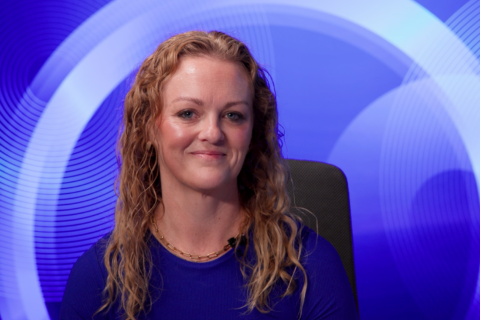As a young child, you may have been told, “Eat your vegetables,” at the dinner table. As it turns out, that was probably sage advice when it comes to fighting diseases, including cancer.
There are several things that can affect your risk of getting all types of cancers. Prime among them are diet and whether someone smokes or exercises, shared Dr. Julie Bauman, director of the GW Cancer Center.
Diet can have a big impact on your risk for cancer and other diseases that can affect chronic inflammation, said Bauman, who took part in WTOP’s Get on Top of Your Health series to talk about cancer prevention, treatment and cancer-fighting research.
“One of those things that makes a really significant difference is the consumption of plants in one’s diet. It’s long been known that diets rich in fruits and vegetables are associated with a reduced risk of multiple kinds of cancer as well as heart disease,” Bauman said. As for red meat and alcohol, she encouraged “everything in moderation.”
Ingesting carcinogens such as combustible tobacco smoke or chewing tobacco increases the risk for cancer. “Not smoking and not using tobacco products is a very important means of reducing your cancer risk, front and center,” Bauman said.
As for your exercise routine, the same kinds of exercise principles that are advocated by the American Heart Association are also associated with a reduced risk of cancer and other inflammatory diseases. That means at least 30 minutes of moderate exercise a day, five days a week.
Pay close attention to the body you live in
Staying on top of cancer screenings is important too. Also, report anything that is abnormal in your body, such as a new lump or lesion, or abnormal bleeding, to a doctor.
“Most people diagnose their own cancers because a person has a sensitivity to their own body and recognizes something that is new,” Bauman said.
Many preventative cancer screenings have been postponed by patients and doctors during the COVID-19 pandemic, including mammographies, colonoscopies and CT scans. Bauman sees signs of dangerous fallout from that.
“Cancer screening works by finding cancer at an early stage, a more treatable and survivable survivable stage,” she said. “We’re seeing this upward shift in the stage of cancers, to later stage at diagnosis. This translates into seeing patients who are less curable as a population, and down the line, we are going to see a bump in cancer-related mortality.”
Vaccinations for cancer prevention
One of the pillars of cancer prevention is the HPV vaccination “because human papilloma virus is responsible for at least 5% of the cancers in our population and is eminently preventable if the vaccine is administered to boys and girls during childhood when it is indicated,” Bauman said.
Right now, there is an epidemic of throat cancer, largely in men, that is driven by HPV, Bauman said. The vaccine is indicated from ages 11 on, before a person would get exposed to HPV.
“It is also recommended that between the ages of 26 and 45, you speak with your primary care doctor about having the HPV vaccine,” she said. “It’s a shared decision with your physician whether the vaccine would be useful for you at that stage of your young or middle adulthood, depending upon your HPV exposure history, personal experiences, and where you are in your relationships.”
She shared the example of someone recently divorced, contemplating new relationships. Perhaps “you’re wondering about whether HPV vaccination would be meaningful for you,” she said. “This conversation is really important to have with your physician.”
The power of plants to fight cancer
The lessons learned from HPV vaccination are some of the most exciting when it comes to immunotherapy and the use of the human immune system to prevent or treat cancer, Bauman said.
She continues to explore ways to interrupt the pathways that lead to cancer. Green chemoprevention, which Bauman is researching, “is the use of plants, or their simple extracts, to prevent cancer. The whole food is what is being studied.”
What type of veggies? Chemoprevention examines the cruciferous vegetable family. Think broccoli, kale, brussels sprouts and cabbage. Phytochemicals in these plants can regulate the body’s capacity to fight environmental carcinogens, such as air pollution, which can lead to chronic diseases including cancer.
“It turns out that the cruciferous vegetable family is very rich in a certain plant chemical (or “phytochemical”) that results in the enhanced ability to detoxify environmental carcinogens,” said Bauman.
Her work on this issue continues at George Washington University.
“My research is looking at a the ability of a broccoli-based supplement, compared to placebo, to detoxify environmental carcinogens in otherwise healthy people who smoke. Bauman has demonstrated this effect over a two-week period and is now working to demonstrate that it is sustainable over a longer period of time — to actually prevent a cancer outcome. A similar nutraceutical has been shown to stimulate detoxifcation of air pollutants in southern China.
What’s next? Immunotherapy and personalized cancer vaccines
Bauman believes there is reason for optimism when it comes to cancer treatments tailored to the individual. Cancer succeeds by hiding from the immune system that would kill it. Researchers are beginning to unravel how cancer does that.
She noted that immunotherapies approved by the Food and Drug Administration have been available for several different cancers for about a decade. “And we are now learning how to be even more specific in how we develop precision immunotherapies matched to an individual’s specific cancer. What I’m talking about is the personalized cancer vaccine,” Bauman said.
She pointed to the HPV or COVID-19 vaccines, which provide a specific set of genetic or protein-based material to educate the immune system to recognize the pattern of an infection. If that infection shows up, it can be killed on the spot.
“The same principles apply to deep genetic sequencing of a tumor and the ability to identify the DNA mutations that are unique about the cancer but not present in the normal cells. Then vaccines can be developed that teach the body to fight that specific cancer, but not attack the normal self” Bauman said.
“We’re at the beginning stages of the personalized cancer vaccine and have just seen the publication of the first trial that shows some efficacy of a personalized cancer vaccine in the setting of melanoma. This is a rapidly moving and exciting field. It definitely connects to the universe of cancer prevention. I am certain we will see this our lifetime.”
Learn more about cancer research and care programs at the GW Cancer Center, and discover additional tips and tactics to get on top of your health on WTOP.com.





